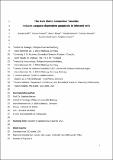Files in this item
The New World arenavirus Tacaribe virus induces caspase-dependent apoptosis in infected cells
Item metadata
| dc.contributor.author | Wolff, Svenja | |
| dc.contributor.author | Groseth, Allison | |
| dc.contributor.author | Meyer, Bjoern | |
| dc.contributor.author | Jackson, David | |
| dc.contributor.author | Strecker, Thomas | |
| dc.contributor.author | Kaufmann, Andreas | |
| dc.contributor.author | Becker, Stephan | |
| dc.date.accessioned | 2017-04-01T23:39:20Z | |
| dc.date.available | 2017-04-01T23:39:20Z | |
| dc.date.issued | 2016-04 | |
| dc.identifier | 242240833 | |
| dc.identifier | 21646c2a-baf3-4f72-a1ee-2b05c95a5645 | |
| dc.identifier | 26769540 | |
| dc.identifier | 84963752694 | |
| dc.identifier | 000374108900005 | |
| dc.identifier.citation | Wolff , S , Groseth , A , Meyer , B , Jackson , D , Strecker , T , Kaufmann , A & Becker , S 2016 , ' The New World arenavirus Tacaribe virus induces caspase-dependent apoptosis in infected cells ' , Journal of General Virology , vol. 97 , no. 4 , pp. 855-66 . https://doi.org/10.1099/jgv.0.000403 | en |
| dc.identifier.issn | 0022-1317 | |
| dc.identifier.uri | https://hdl.handle.net/10023/10574 | |
| dc.description | This work was supported in part by fellowships from the Jürgen Manchot Stiftung (S.W.; http://www.manchot.org), the German Research Council [SFB 1021 TP A04 (A.K.), SFB 1021 TP B03 (S.B., S.W.) and SFB 1021 TP B05 (T.S.); http://www.uni-marburg.de/sfb1021], the Canadian Institutes of Health Research (A.G.; http://www.cihr-irsc.gc.ca) and a Medical Research Council Centenary Travel Award (B.M.). | en |
| dc.description.abstract | The Arenaviridae is a diverse and growing family of viruses that already includes more than 25 distinct species. While some of these viruses have a significant impact on public health, others appear to be non-pathogenic. At present little is known about the host cell responses to infection with different arenaviruses, particularly those found in the New World; however, apoptosis is known to play an important role in controlling infection of many viruses. Here we show that infection with Tacaribe virus (TCRV), which is widely considered the prototype for non-pathogenic arenaviruses, leads to stronger induction of apoptosis than does infection with its human-pathogenic relative Junín virus. TCRV-induced apoptosis occurred in several cell types during late stages of infection and was shown to be caspase-dependent, involving the activation of caspases 3, 7, 8 and 9. Further, UV-inactivated TCRV did not induce apoptosis, indicating that the activation of this process is dependent on active viral replication/transcription. Interestingly, when apoptosis was inhibited, growth of TCRV was not enhanced, indicating that apoptosis does not have a direct negative effect on TCRV infection in vitro. Taken together, our data identify and characterize an important virus-host cell interaction of the prototypic, non-pathogenic arenavirus TCRV, which provides important insight into the growing field of arenavirus research aimed at better understanding the diversity in responses to different arenavirus infections and their functional consequences. | |
| dc.format.extent | 12 | |
| dc.format.extent | 2963499 | |
| dc.language.iso | eng | |
| dc.relation.ispartof | Journal of General Virology | en |
| dc.subject | QH301 Biology | en |
| dc.subject | QR355 Virology | en |
| dc.subject | NDAS | en |
| dc.subject | SDG 3 - Good Health and Well-being | en |
| dc.subject.lcc | QH301 | en |
| dc.subject.lcc | QR355 | en |
| dc.title | The New World arenavirus Tacaribe virus induces caspase-dependent apoptosis in infected cells | en |
| dc.type | Journal article | en |
| dc.contributor.institution | University of St Andrews. School of Biology | en |
| dc.identifier.doi | 10.1099/jgv.0.000403 | |
| dc.description.status | Peer reviewed | en |
| dc.date.embargoedUntil | 2017-04-01 |
This item appears in the following Collection(s)
Items in the St Andrews Research Repository are protected by copyright, with all rights reserved, unless otherwise indicated.

